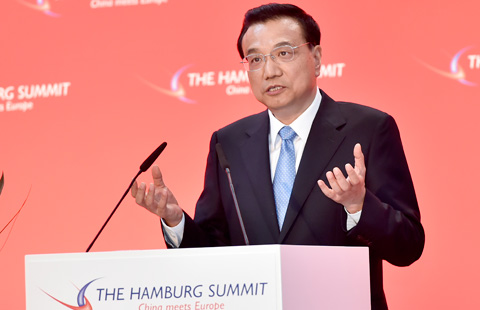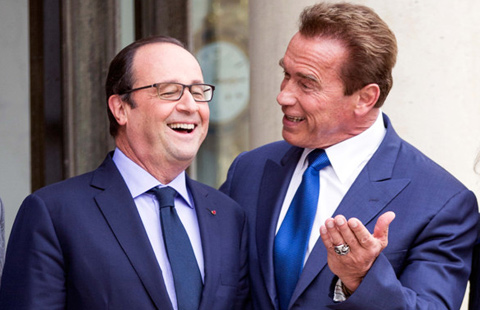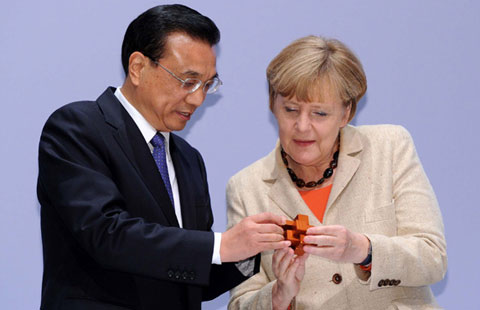China faces risks in Brazil's energy sector: Report
Updated: 2014-10-12 02:29
By PAUL WELITZKIN in New York(China Daily Latin America)
|
||||||||
China has put billions in Brazil's energy sector since 2009, but a report from a Latin American think tank says that investment is in a cautious mode due to price controls, local content requirements and the looming Brazilian presidential election.
"Chinese investors are moving at a measured pace into Brazil's energy sector, with far more interest in some industries than others," said the report from the Inter-American Dialogue (IAD), a Washington-based research group for policy analysis on issues in Western Hemisphere affairs. "As investment opportunities open up around the world, Chinese firms are also increasingly weighing the costs and risks of investing in Brazil with investment options elsewhere."
The report - Navigating Risk in Brazil's Energy Sector: The Chinese Approach - was published on Oct 2. IAD started a China-Latin America program three years ago as the China-Latin American relationship began to expand, according to Margaret Myers, director of the program. IAD is funded through donations from private foundations and corporate sponsorships.
Myers said since 2009 China has invested more than $10 billion for oil development in Brazil and there are two schools of thought on the reason for the investment. "China is partnering with Brazilian firms like Petrobas (a state-controlled oil company) to diversify its sources of oil. Since China imports most of its oil, it is also trying to ensure a steady supply in the global market. My guess is it's a combination of both," she told China Daily in an interview.
Myers said Brazil's government-imposed price caps on fuel and electricity have not only shaken Chinese investors, but foreign energy firms as well. "Oil projects need a huge amount of capital and price controls force companies to take on more debt to deliver an upstream project," she said.
Investors dislike uncertainty so the investment community is anxiously waiting to see what happens in the country's presidential race. On Oct 5, President Dilma Rousseff received 42 percent in the first round of balloting, about 8 percent more than Aécio Neves, a business-friendly candidate. They will face each other in run-off on Oct 26.
Another issue holding back investment is Brazil's regulations on local content and suppliers, Meyers said. The country requires that a percentage of products and services in oil-exploration projects must be manufactured or sourced in Brazil. This limits the choice of suppliers and in some cases can mean higher prices. “This is not only an impediment to investment by Chinese firms but foreign firms as well," she noted.
The IAD report also sees the need for Chinese oil companies to take on a more public role in Brazil. "Chinese oil firms are looking to develop existing projects and partnerships rather than forging new ones. To do so, Chinese firms need to bring in more than capital - they need more capable personnel who can operate projects. That means gaining familiarity with local market dynamics, legislative frameworks, and labor and indigenous movements. With this in mind, the region might expect additional government, public and community relations activity from Chinese firms in the coming years," the report said.
Myers said most of the Chinese investment comes from firms like China National Petroleum Corp in oil and the State Grid Corp in electricity.
"Brazil has a huge need for investment in its transmission infrastructure like power lines and transfer stations. State Grid is looking to partner with Brazilian firms to invest in these projects. But price controls may also be holding back the Chinese since they are investing for a profit," she said.
Renewable energy like wind and solar represent an enticing investment opportunity for China, according to Myers. "China has been busy developing some interesting technology in renewable energy due in part to air pollution problems in the country. They are eager to export that technology to not only Brazil, but other countries as well," she said.
Renewable energy is also an area that is seeing private investment from China. Myers said Yingli Solar was a sponsor of the 2014 FIFA World Cup soccer tournament held in Brazil this summer.
"Policymakers (in Brazil) must recognize the need for a comprehensive plan and incentives to attract more investment in renewable energy," said Myers.
paulwelitzkin@chinadailyusa.com

 Li says focus is on long-term growth
Li says focus is on long-term growth
 Hollande meets with Arnold Schwarzenegger in Paris
Hollande meets with Arnold Schwarzenegger in Paris
 Air China's first Boeing 747-8 set to take off
Air China's first Boeing 747-8 set to take off
 Malala's hometown celebrates her Nobel Peace Prize
Malala's hometown celebrates her Nobel Peace Prize
 Hello Kitty, happy 40th birthday!
Hello Kitty, happy 40th birthday!
 Li pins high hopes on China-Germany cooperation
Li pins high hopes on China-Germany cooperation
 Call of the wild
Call of the wild
 China's trade with Texas taking off
China's trade with Texas taking off
Most Viewed
Editor's Picks

|

|

|

|

|

|
Today's Top News
Texas health care worker tests positive for Ebola
27 Chinese among hostages freed in Cameroon
Guangdong sees 1,552 new dengue cases
PLA warns of training mismatch with real combat
China faces risks in Brazil's energy sector
Premier hails Hamburg's role in cooperation
Visit takes China-Germany ties to new height
US support for HK protest slammed
US Weekly

|

|







